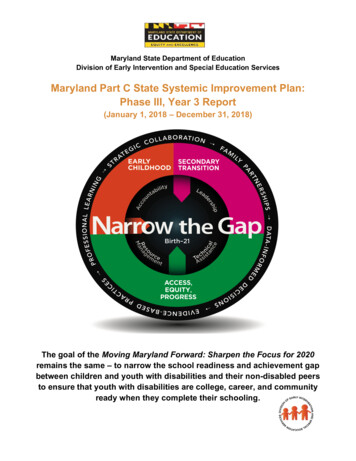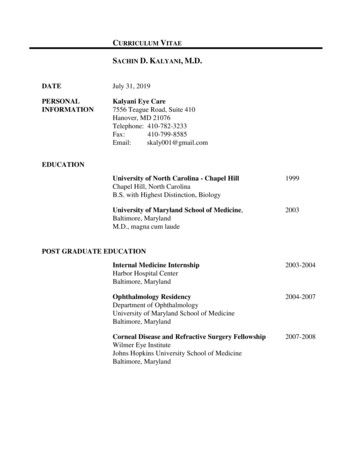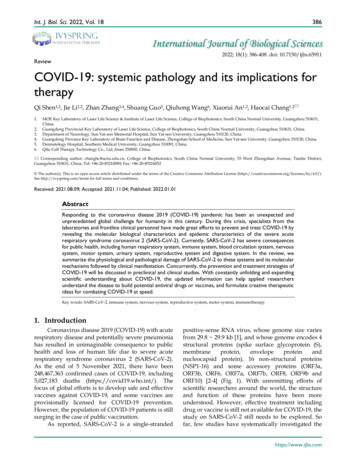
Transcription
Maryland State Department of EducationDivision of Early Intervention and Special Education ServicesMaryland Part C State Systemic Improvement Plan:Phase III, Year 3 Report(January 1, 2018 – December 31, 2018)The goal of the Moving Maryland Forward: Sharpen the Focus for 2020remains the same – to narrow the school readiness and achievement gapbetween children and youth with disabilities and their non-disabled peersto ensure that youth with disabilities are college, career, and communityready when they complete their schooling.
Part C State Systemic Improvement Plan (SSIP)Table of ContentsIntroduction 4A. Summary of Phase III, Year 3 .51. State-Identified Measurable Result, Theory of Action, Logic Model 52. Coherent Improvement Strategies. .83. Evidence-Based Practices 124. Evaluation Activities, Measures, Outcomes . .145. Changes to Implementation and Improvement Strategies . .14B. Progress in Implementing the SSIP .151. Description of Implementation Progress 15a. Plans Implemented . .15b. Intended Outputs Accomplished . .192. Stakeholder Involvement . .20a. Information Dissemination about Implementation . .20b. Input into SSIP Implementation . .21C. Data on Implementation and Outcomes .231. Monitoring and Measurement of Outputs to Assess Effectiveness . .23a. Evaluation Measure Alignment with Theory of Action 23b. Data sources for All Measures including Collection Procedures and Timelines 23c. Baseline Data for Key Measures . 23d. Data Collection Procedures and Timelines . .232. Progress and Modifications to SSIP. .23a. Review of Key Data for Progress .23b. Change to Baseline Data for Key Measures. .23c. How Data Informs Change to Implementation and Improvement Strategies 55d. Data-Informed Next Steps in the SSIP Implementation . 55e. Data-Informed Modifications to Intended Outcomes . 563. Stakeholder Involvement in the SSIP evaluation . .56a. Information Dissemination about SSIP Evaluation . .56b. Input into SSIP Evaluation . .56D. Data Quality Issues .581. Data Limitation Affecting Progress in Implementation and Achieving the SiMR . .58a. Concerns Related to the Quality or Quantity of Data . .58b. Implications for Assessing Progress or Results .58c. Plans for Improving Data Quality .58E. Progress Toward Achieving Intended Improvements. 601. Assessment of Progress. .60a. Infrastructure Changes That Impact Achievement of the SiMR,Maryland State Department of Education, Division of Early Intervention/Special Education Services – SSIP Phase III, Year 32
Sustainability, and Scale-up . .60b. Evidence of Fidelity of Implementing Evidence-Based Practicesand Desired Effects . . .63c. Progress Toward Short- and Medium-Term Outcomes LeadingToward the SiMR . 65d. Measurable Improvements in the SiMR . . 66F. Plans for Next Year . 681. Additional Activities and Timeline . . 682. Evaluation Activities Including Data Collection, Measures, and Expected Outcomes.683. Anticipated Barriers and Steps to Address Barriers 694. Additional Support and/or Technical Assistance Needed .70ATTACHMENT A: Evaluation PlanMaryland State Department of Education, Division of Early Intervention/Special Education Services – SSIP Phase III, Year 33
Maryland State Systemic Improvement PlanPart C Phase III, Year 3 ReportIntroductionAs the lead agency for the Maryland Infants and Toddlers Program (MITP), an interagency, familycentered program supporting our youngest learners with disabilities and their families, the MarylandState Department of Education (MSDE) provides innovative leadership, accountability, technicalassistance, and resource management to implement a seamless system of services Birth toKindergarten. With a laser focus on the Division of Early Intervention and Special Education Services’(DEI/SES) Strategic Plan, Moving Maryland Forward, and in alignment with Results DrivenAccountability (RDA), the MITP continues to transform and enhance support to local Infants andToddlers Programs (LITPs) to both comply with regulatory requirements and to implement evidencebased practices in support of the ultimate goal of narrowing the school readiness gap. The phased workof Maryland’s Part C State Systemic Improvement Plan (SSIP) with continuous stakeholder guidance,provides a vehicle to focus on positive social-emotional development, skills, and relationships to prepareour youngest learners for kindergarten. Significant implementation and outcomes progress occurredduring Phase III, Year 3 as evaluation activities moved forward leading to adjustments inimplementation. Creating shared understanding through effective, high-performing teams to make datainformed decisions is evident throughout this year’s work and will continue to be essential for fullimplementation of evidence-based practices.This report outlines Maryland’s progress in implementing the SSIP during Phase III, Year 3 includingclear descriptions of the coherent improvement strategies aligned to the DEI/SES strategic plan withfocus areas of participation and learning, improvements to infrastructure, and implementation ofevidence-based practices with fidelity, explanations of how stakeholders have engaged in the SSIPprocess, data on implementation and outcomes, data quality issues, progress toward achievingintended improvements, and plans for next year. Maryland’s Part C SSIP has intensified State/localcollaborative work which is now leading to shifts in statewide procedures and practices supportingoverall implementation of evidence-based practices. These include: significant revisions to the local grant application for the distribution of early interventionfunding to local programs to identify infrastructure and personnel development strategiesneeded for continuous improvement, including the implementation of EBPs;the implementation of a revised Individualized Family Service Plan (IFSP) process anddocument to support EBPs in the development, implementation and evaluation of IFSPs; andthe development of revised early intervention personnel standards, going into effect on July 1,2019, to ensure all staff have foundational skills in key principles and recommended practices.Maryland State Department of Education, Division of Early Intervention/Special Education Services – SSIP Phase III, Year 34
A. Summary of Phase III, Year 31. Theory of Action, Logic Model, and State-identified Measurable Result (SiMR)Implementation of Maryland’s Part C SSIP is in its third year as key partners, internal and externalstakeholders, and an external evaluator, continued to strengthen the alignment of the theory of action,the logic model, and the evaluation plan.Maryland’s Theory of Action is:IF the Maryland Infants and Toddlers Program (MITP) and its partners provide leadershipfor strategic collaboration and resource management through enhanced teaming structuresand provide high quality professional learning and support to Local Implementation Teamsthrough systems and content coaching in: Data-informed decision-making: Implementation Science/Team, Analyze, Plan, Implement, Track (TAP-IT); Effective, Functional, Routines-Based IFSPs; and Evidence-based practices:o Reflective Coaching;o Routines-Based Interview (RBI); ando Social Emotional Foundations for Early Learning (SEFEL)/Pyramid Model (PM).THEN local Infants and Toddlers Programs will have the capacity to provide ongoingsupport to early care and education providers to implement evidence-based strategies andmeasure child outcomes with fidelity. Fidelity of implementation will enable early care andeducation providers to deliver high quality reflective coaching with families, caregivers, andpeers, and evidence-based family assessment and social emotional instructional practicesto develop effective, functional, routines-based IFSPs within the framework of the threeearly childhood outcomes,WHICH will substantially increase the rate of growth of positive social-emotional skills forinfants, toddlers, and preschool age children with developmental delays/disabilities in fourlocal Infants and Toddlers Programs (Figure 1).Maryland State Department of Education, Division of Early Intervention/Special Education Services – SSIP Phase III, Year 35
Figure 1. Maryland Infants and Toddlers Program: Theory of Actionwill provide leadership for strategiccollaboration and resource managementthrough enhanced teaming structures andhigh quality professional learning andsupport to local implementation teamsthrough systems and content coaching in: Data-informed decision making:-Implementation Science/TAP-IT-High quality functional routines-basedIFSPs Evidence-based practices:- Reflective Coaching- Routines-Based Interview (RBI)- Social Emotional Foundations for EarlyLearning (SEFEL)/Pyramid Modelwill have the capacity toprovide ongoing support toearly care and educationproviders to implementevidence-based strategies andmeasure child outcomes withfidelity.Fidelity of implementation will enable early care andeducation providers to deliver high quality reflectivecoaching with families, caregivers, and peers, andevidence-based family assessment and socialemotional instructional practices to develop highquality functional routines-based IFSPs within theframework of the three early childhood outcomes.will substantiallyincrease the rateof growth ofpositive socialemotional skills ininfants, toddlers,and preschool agechildren withdevelopmentaldelays/disabilitiesin four localInfants andToddlersPrograms.MSDE: Division of Early Intervention/Special Education ServicesMaryland’sPart C SiMR was developed in consultation with our internal and external stakeholders overa year-long “leading through convening” process during Phase I. Additional stakeholder input wasgathered during Phase II and continued to be gathered during Phase III, to build a shared vision aroundevidence-based practices supporting social-emotional development. In Phase III, Year 2 a minor revisionwas made to the Maryland Infants and Toddlers Program: Theory of Action as the MSDE andstakeholders identified reflective coaching as the evidence-based adult learning strategy to support thetraining and ongoing coaching to implement both the Routines-Based Interview (RBI) and SocialEmotional Foundations for Early Learning (SEFEL). In previous versions of the Theory of Action,reflective coaching was only tied to the implementation of SEFEL. During Phase III, Year 3 stakeholdersagreed to begin using the term SEFEL/Pyramid Model to integrate this framework across educationsystems (Birth – 21) in alignment with the work of the National Center for Pyramid Model Innovations(NCPMI). Pyramid Model is reflected in both the MITP Theory of Action and the MITP Part C LogicModel.Last year in Phase III, Year 2, input and feedback from multiple stakeholder groups resulted in furtherrefinement of the MITP - Part C SSIP Logic Model with implementation activities and outputs, as well asshort and medium-term outcomes emphasizing both infrastructure improvements and theimplementation of evidence-based practices (EBPs). No further revisions to the logic model were madeduring Phase III, Year 3. The logic model continues to serve as the foundation of the evaluation planwith the resources invested supporting implementation activities and outputs through effective teaming,technical assistance activities, professional learning opportunities, and tools. The impact of theseresources and activities are intended to result in:a) active participation and learning by all participants (short-term outcomes);b) improvements in infrastructure and local implementation of evidence-based practices withfidelity (medium-term outcomes); and ultimatelyc) an increase in the rate of growth of positive social-emotional skills and relationships for youngchildren with disabilities.Maryland State Department of Education, Division of Early Intervention/Special Education Services – SSIP Phase III, Year 36
The Theory of Action is represented through a detailed logic model that demonstrates the flow frominputs and outputs, and from outputs to outcomes (Figure 2). The long-term result of increasing positivesocial-emotional skills and relationships is expected to be directly influenced by both infrastructureimprovements and implementation of evidence-based practices with fidelity. This can only occur if keypartners and stakeholders are engaged and actively involved in the process.Figure 2. Maryland Infants and Toddlers Program - Part C SSIP Logic Model with SiMRThe Maryland Infants and Toddlers Program State Systemic Improvement Plan: Logic ModelIMPLEMENTATIONINPUTSACTIVITIES Intra- and inter-agencyState and local staff Research on EvidenceBased Practices andImplementationScience in EC Partnerships with locallead agencies andexternal organizations(PPMD, MCIE, IHEs) National, State, andlocal experts MSDE Resources (datasystems, B-K ChildOutcome Gateway,Maryland LearningLinks, Making AccessHappen, SEFEL/PMWebsite) Engage in strategicpartnerships/TeamingStructuresDevelop Professional Learning(PL)/Training for State andLocal Implementation Teams in:Implementation Science (IS)Tools, Systems Coaching andTAP-ITConduct needs assessments/surveys with local programsaround EBPs and COS Conduct professional learningand ongoing follow-up contentcoaching in EBPs (ReflectiveCoaching, RBI, SEFEL/PM) Develop PL/Training forimplementation of RBI,Reflective Coaching/SEFEL/PM, including use of theChild Outcomes Summary(COS) process with fidelity Online real-time IFSPdata system in LADSS Assemble workgroups forongoing COS/IFSP work COS integrated intoIFSP and IEP Disseminate resources topromote implementation, scaleup, and sustainability Tiers of GeneralSupervision/Engagement structureOUTPUTSActions we TakeResources we Invest MSDE DSE/EISStrategic PlanProducts we Generate Effective State Communication Trained MSDE SystemsCoaches (B-K Liaisons) Trained Local SystemsCoaches skilled in TAP-IT andstage-based EBPimplementation Protocol for State/LITPTechnical Assistance Online resources to supportsystems coaching, IS, and TAPIT Implementation fidelity tools forTAP-IT, systems coaching,EBPs and COS IFSP process/tools to supportimplementation of EBPs State/Local Annual ProfessionalLearning InstitutesParticipation andLearningMSDE and LITP provide: High Quality PD High Quality ResourcesParticipants learn: Mental health services/agencies (local/state) Systems Coaching Data-Informed DecisionMaking Reflective ContentCoaching Social EmotionalFoundations for EarlyLearning (SEFEL)/Pyramid Model (PM) Routines BasedInterview (RBI) Integrating EBPs intofunctional routinesbased IFSPs COS processParticipants Use: Systems CoachingOUTCOMESMEDIUM TERMImplementationSHORT TERMFoundationAvailable Resourcesrelated to EBPs and theCOS processChanges that OccurResults for ChildrenInfrastructure Improvements MSDE increases strategiccommunication andcollaboration with intra- andinter-agency stakeholders tosupport SSIP implementation State systems coachesprovide programmaticsupport and technicalassistance consistent withthe MD DifferentiatedFramework to local programsto implement EBP withfidelity State and Localimplementation teams use anevidence-based datainformed decision makingprocess with fidelityThe MarylandInfants andToddlers Programwill substantiallyincrease the rate ofgrowth of positivesocial-emotionalskills in infants,toddlers, andpreschool agechildrenFour (4) LITPs implement EBPsin early intervention SSIP Programs have initiatedthe practice of using RBIswith fidelity SEFEL/PM is implemented inSSIP Programs with fidelity Reflective Systems andContent Coaching isimplemented with fidelity IFSP child and familyoutcomes demonstrate “highquality” COS is implemented withfidelity Braided Funding Broad stakeholderinvolvementLONG TERMImpactJanuary 2019The State-identified Measurable Result (SiMR) measures the overall impact or long-term results of thePart C SSIP work. The MITP will substantially increase the rate of growth of positive social-emotionalskills in infants, toddlers, and preschool age children (Indicator 3A, Summary Statement #1). Table 1below shows the child outcomes data aggregated and weighted across the four SSIP jurisdictions frombaseline (2015/2016) to current (2017/2018). Please note the baseline was re-adjusted in the PhaseIII, Year 1 report to account for new changes in data collection methodology of child outcomes.Table 1. Indicator 3A, Summary Statement #1 Results for Infants, Toddlers, and PreschoolersAcross the Four SSIP Local Infants and Toddlers Programs (LITPs)2015/2016 - nd State Department of Education, Division of Early Intervention/Special Education Services – SSIP Phase III, Year 37
After an initial increase last year, the child outcomes results have remained steady in Phase III, Year 3.Gains in progress take time since the child outcomes rating process is done at the end of a child’s timein Part C services and in Maryland that may not occur until the beginning of the school year followingthe child’s fourth birthday. These overall results are expected and the State will continue to monitorimplementation and child outcomes progress throughout the year and in future reports to illustrate aclear picture of SSIP effects.2. Coherent Improvement Strategies ImplementedThroughout the development and implementation of the SSIP, the MSDE DEI/SES Strategic Plan,Moving Maryland Forward: Sharpen the Focus for 2020, has three strategic imperatives driving the workof the Division: (1) Early Childhood; (2) Access, Equity, and Progress; and (3) Secondary Transition.The work of the Part C SSIP aligns with the early childhood imperative to narrow the school readinessgap. The strategic plan calls for the implementation of five key strategies that cross all three imperativesto improve results for children and youth with disabilities and their families: Strategic CollaborationFamily PartnershipsData-Informed DecisionsEvidence-Based PracticesProfessional LearningWhile focusing on the implementation activities andstrategies in the theory of action, logic model, andevaluation plan, the work of the Part C SSIP is alignedwith the strategic plan and early childhood goal: toimplement a seamless and comprehensivestatewide system of coordinated services withinhome, community, and early childhood settings forchildren with disabilities - birth to kindergarten and their families to narrow the school readinessgap, specifically in the area of social-emotionaldevelopment and relationships.The focused work of the Part C SSIP has evolved to reflect and align the strategic plan’s key strategieswith acknowledgement that each of these improvement strategies must address both personneldevelopment needs AND infrastructure enhancements.Coherent improvement strategies: Professional Learning: including coaching, technical assistance, resource development, andinformation disseminationContent Coaching and Systems CoachingEvidence-Based Practices with Fidelity: Reflective Coaching, Routines-Based Interview,SEFEL/Pyramid Model, Data-Informed Decision MakingStrategic Collaboration and Data-Informed Decision Making with StakeholdersFamily PartnershipsMaryland State Department of Education, Division of Early Intervention/Special Education Services – SSIP Phase III, Year 38
Professional LearningDuring Phase III, Year 3 professional learning activities were implemented with the four SSIP LITPs aswell as with Maryland’s Birth to Kindergarten early intervention and preschool special education leaders.The DEI/SES maintained contracts with the University of Maryland School of Social Work (UM-SSW)and the Johns Hopkins University/Center for Technology in Education (JHU-CTE) to support State-levelcontent experts in Reflective Coaching, RBI, and SEFEL/PM. The four SSIP LITPs participated in bothongoing as well as differentiated professional learning and coaching activities based on identified localprogram implementation needs producing steady gains in knowledge and skills.During 2017, the MSDE DEI/SES developed, piloted,and rolled out a new Birth to Kindergarten ChildOutcomes Summary (COS) training protocol with acomprehensive website to support integration of earlychildhood outcomes into the IFSP and IEP process andthe COS rating process to fidelity (refer to MD Part CSSIP, Phase III, Year 2 Report pgs. 10-11). Over thecourse of Phase III, Year 3, local programs have trainedearly intervention and preschool special educationproviders and teachers using the revised trainingprotocol. The Maryland Child Outcomes SummaryCompetency Check (MD COS-CC) was developed andpiloted as the culminating activity at the end of training.This online assessment has 15 knowledge questionsand a case study supporting Maryland’s COS CoreComponents for fidelity. During 2018, the majority of staffin the four SSIP LITPs completed and passed the MDCOS-CC. The MSDE is requiring all early interventionstaff to complete this competency check by the end ofSFY 2020.In June 2018, the State engaged all LITPs in five regional IFSP Training of Trainers (ToTs) to supportthe rollout of Maryland’s revised IFSP process, document, and online tool. Following the June 2018ToT, each local program including the four SSIP LITPs began training all early intervention staff inpreparation for the rollout of the revised IFSP system on October 1, 2018. Anecdotal data from the SSIPLITPs indicate the revised IFSP better supports evidence-based early intervention service delivery, andin particular authentic child and family assessment practices.Finally, the State continued to engage in a Regionalization for Results model to support theimplementation of the MSDE DEI/SES strategic plan in early childhood through five regionalprofessional learning opportunities with Birth to Kindergarten early intervention and special/ generaleducation leaders. Last year the focus was From Roots to Results: Implementing a Birth toKindergarten System of Services Through Evidence-Based Teaming Practices, Natural and InclusiveLearning Opportunities, and Effective Coaching. This year in December 2018, the emphasis wasImplementing a Comprehensive Early Childhood System: Focus on Fidelity. The Part C SSIP work hasdirectly impacted the content and delivery of these professional learning efforts which also include localearly childhood implementation grants to focus on the installation, implementation, scale-up, andMaryland State Department of Education, Division of Early Intervention/Special Education Services – SSIP Phase III, Year 39
sustainability of evidence-based practices with fidelity.Systems and Content CoachingDuring Phase III, Year 3 the State continued implementation of Systems Coaching through regionalBirth to Kindergarten Liaisons/State Systems coaches. This strategy provides a high level ofengagement with all four of the Part C SSIP programs who are identified as being in the Focused Tierof Performance Support within the DEI/SES Differentiated Framework (refer to MD Part C SSIP, PhaseIII, Year 2 Report pgs. 6-7). Systems Coaching continued as the technical assistance (TA) approachemployed by the DEI/SES to implement the Tiers of General Supervision and Performance Supportwith all Local Lead Agencies (LLAs) and Local School Systems (LSSs). All universal, targeted, andfocused programmatic support and TA are documented in the DEI/SES TA Log.The DEI/SES also continued to support State-level content experts/coaches, contracted with UM-SSWand JHU-CTE, to provide regular coaching cycles with local content coaches around the implementationof RBI and SEFEL/PM. This year, quarterly reflective coaching sessions were specifically focused onskill-building around colleague-to-colleague reflective coaching. Regular individualized coachingsessions were held with local coaches and local leaders for each SSIP program based on identifiedpriorities and needs. While LITPs are setting aside time to make the regular, ongoing coaching a priority,further capacity building is needed to effectively address social-emotional needs of children and familiesand to support colleague-to-colleague reflective coaching.Evidence-Based Practices with FidelityAs the four LITPs, in collaboration with the State, have worked to install, implement, and scale-upevidence-based practices, fidelity of implementation has started to emerge. The State ImplementationTeam (SIT) finalized the Guide to RBI Training and Coaching in the beginning of 2018, which outlinesthe minimum expectations of training, certification, and ongoing coaching at the State and local levels.Initial RBI implementation to fidelity, using the RBI Implementation Checklist, has almost doubled acrossfour LITPs over the past year.While all four LITPs have differing levels of implementation of SEFEL/PM, collective agreement by theSIT on the Home Visiting Benchmarks of Quality (BoQ) increased fidelity of implementation of Tier 1Data-Based Decision-Making practices. Three out of the four LITPs are now implementing a socialemotional screening process. In Year 4, the SIT has agreed to utilize the revised Pyramid Model EarlyIntervention BoQ developed by NCPMI, as well as explore implementation of the Early InterventionistPyramid Model Practitioner Fidelity Tool when it is completed.With the shift during Phase III, Year 2 of reflective coaching as the evidence-based adult interactionstyle to support any early intervention strategy, there was a heightened focus this year on colleague-tocolleague coaching practices during the quarterly EBP reflective coaching sessions. Moderate gains inknowledge and skills by local content coaches were noted as measured by the Coaching PracticesRating Scale self-assessment tool. Each of the four SSIP LITPs has realized the need for a targetedfocus on reflective coaching at the practitioner level as well as with colleagues. Continued work withnational experts around reflective coaching to fidelity will be a priority over the next year through Stateand local sponsored Master Coach training.Maryland State Department of Education, Division of Early Intervention/Special Education Services – SSIP Phase III, Year 310
During Phase III, Year 3, the State continuedto support an evidence-based data-informeddecision-making model, TAP-IT (Team,Analyze, Plan, Implement, Track), integratedwithin a digital portfolio referred to as the TAPIT DP. This evidence-based tool specificallyassists the State Implementation Team (SIT)and the four Local Implementation Teams(LITs) to use data in a practice to policyfeedback loop to make needed , RBI, SEFEL/PM), the COSprocess, and high-quality, functional, routinesbased IFSPs (refer to MD Part C SSIP, PhaseIII, Year 2 Report pgs. 9-10). Both the SIT andLITs became more versed in the TAP-IT process this year, although fidelity of implementation at thelocal level requires additional attention.Strategic Collaboration for Data-Informed Decisions with StakeholdersDuring Phase III, Year 3 the State continued to leverage strategic collaborations by engaging key earlychildhood partners and by supporting consistent, involved implementation teams. The Maryland Part CSSIP Teaming Infrastructure (Figure 3) continues to provide robust direction and support throughongoing stakeholder engagement for effective SSIP implementation and evaluation. The SIT becamea powerful vehicle to move the work forward with key partners and LITP leaders making adjustmentsbased on data to improve implementation at the local level. LITs met regularly to specifically reviewdata and problem-solve strategies for effective implementation at the practitioner level. Withdocumented strategic collaboration results, this teaming infrastructure provides a model for the scaleup of local seamless, comprehensive Birth to Kindergarten (B-K) systems.Figure 3. Maryland Part C SSIP: Implementation Teaming InfrastructureMaryland State Department of Education, Division of Early Intervention/Special Education Services – SSIP Phase III, Year 311
Family PartnershipsA specific outgrowth from the intra- and interagency work of the SIT was the initiation of a newcollaboration with The Parents’ Place of Maryland (PPMD), the statewide Parent Training andInformation Center funded by OSEP. PPMD is a key partner on the SIT and through this collaborationthe need was identified to intentionally engage families of young children receiving early interventionservices in a parent leadership program. During Phase III, Year 3, the MSDE DEI/SES funded PPMDto develop, pilot, and evaluate a new multi-session training program called Baby LEADers: Beginningthe Journey. This program has been specifically designed for parents of children receiving earlyintervention, preschool, or kindergarten special education services. PPMD provides regular updatesabout the start-up of the Baby LEADers program to the SIT and plans to share evaluation data at theend of the pilot training phase to determine next steps.3. Evidence-Based Practices ImplementedDuring Phase III, Year 3, the SIT and four LITs continued to support the installation and initial to fullim
based practices in support of the ultimate goal of narrowing the school readiness gap. The phased work of Maryland's Part C State Systemic Improvement Plan (SSIP) with continuous stakeholder guidance, provides a vehicle to focus on positive social-emotional development, skills, and relationships to prepare our youngest learners for kindergarten.










